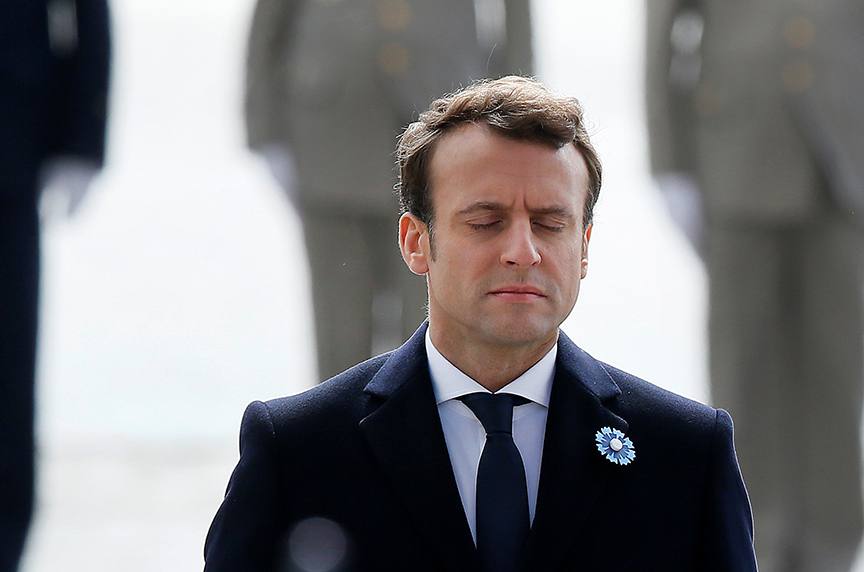 Emmanuel Macron’s election as the next president of France is consequential not just because it is the first time that a centrist who has never held elected office has won or that it reinforces, after the recent Dutch and Austrian elections, the fact that the forces of nationalism have, at least for now, been kept at bay in Europe.
Emmanuel Macron’s election as the next president of France is consequential not just because it is the first time that a centrist who has never held elected office has won or that it reinforces, after the recent Dutch and Austrian elections, the fact that the forces of nationalism have, at least for now, been kept at bay in Europe.
Macron’s victory is also hugely important for France’s role on the world stage, the European Union, and the US-European alliance. This is especially true given the combination of a US president who is still discovering the value of having allies and a French president-elect who is about to be tested by global challenges that range from terrorism to trade and climate agreements.
Macron’s experience is in economics and finance, not foreign policy. But he is a quick study, a product of France’s highly-regarded elite universities, and a very well-connected member of the French elite who is able to draw on his country’s best diplomats and security experts.
But there is no substitute for experience when it comes to world affairs, especially if you are the leader of the European Union’s only nuclear power and most powerful military force (in light of the United Kingdom’s plans to exit the EU), not to mention a key player in NATO.
Within the EU, Macron’s immediate objectives will center on his relationship with German Chancellor Angela Merkel (the first foreign leader whom Macron will meet). He will seek to re-establish the Franco-German tandem, which became unbalanced as a result of French domestic weakness in recent years, and deal with Brexit, which provides an opportunity for France to reassert its European role.
The weakness of Macron’s predecessor, François Hollande, and disunity within Europe made British Prime Minister Theresa May feel she could be more demanding in the Brexit negotiations. Macron is expected to agree with other European leaders that the United Kingdom cannot maintain special access to the EU marketplace if it remains unwilling to abide by the EU’s terms.
Macron is a committed Europeanist. He wants to reform the EU by making it more democratic and less bureaucratic, but also responsive to the needs of those in economic crisis, and to enhance the EU’s global role, which will hinge in part on his plans for economic renewal in France.
At the same time, Macron is a firm believer in NATO and the Atlantic alliance. He was, by far, the most pro-American and anti-Russian presidential candidate in the recent French election. He is likely to be tested by US President Donald J. Trump, whom he will meet on May 25 at a NATO summit in Brussels. Trump might confuse Macron’s youth, political inexperience, and eagerness to please for weakness. Analysts say Trump respects those who project strength, which is surely what Macron’s advisors will recommend he do.
Macron sees France’s historically close relationship with the United States as an opportunity. His plans to increase defense spending by €50 billion annually will be welcome news in Washington, though under his campaign program France is not expected to reach NATO’s 2 percent of GDP defense spending target—a key Trump demand—until 2025.
Macron may find some common ground with Trump. They are both new to politics, share a pragmatic approach to issues, and are both pro-business leaders who want to cut taxes and lessen regulations. In addition, Macron is fluent in English, which Trump will appreciate.
France has, in recent years, played an essential role assisting US military operations, especially in Africa, Iraq, and elsewhere in the war against the Islamic State of Iraq and al-Sham (ISIS) and other terrorists. France and the United States also share a longstanding relationship on intelligence and counterterrorism cooperation.
Macron was not pleased with Trump’s early comments questioning the value of NATO and denigrating the EU, but Trump and his officials have backed off such characterizations, even calling for “a strong Europe.” In the coming weeks and months, Macron can assess the degree to which Trump matches words with actions in the form of concrete support for Europe.
There will be some challenges in the Franco-American relationship. The two governments are, for example, likely to clash on issues from Russia and the Iran nuclear deal to trade and climate change. Macron supports recent international agreements. Trump, on the other hand, opposes multilateral trade agreements and is reportedly considering leaving the Paris agreement on climate change.
Macron’s pro-US and centrist political approach, combined with the shared interest of both countries in addressing security challenges such as terrorism and nuclear nonproliferation, may provide the basis for a renewal of the Franco-American relationship provided that the Trump administration is willing.
Louis Golino, an independent writer, was formerly at the Library of Congress’ Congressional Research Service where he analyzed European affairs and US-European relations.
Image: French President-elect Emmanuel Macron attended a ceremony to mark the end of World War II at the Tomb of the Unknown Soldier at the Arc de Triomphe in Paris on May 8. (Reuters/Francois Mori)
